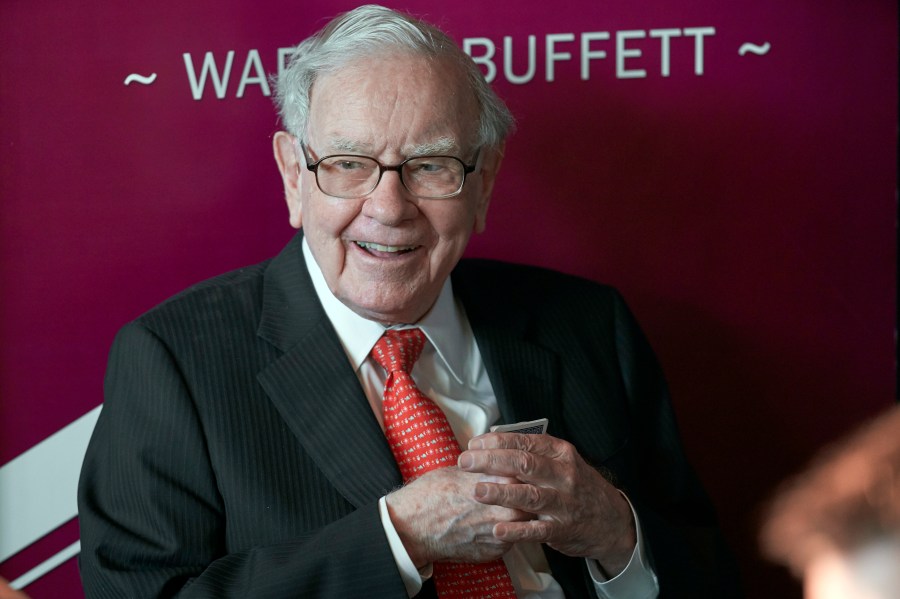Opinion: Warren Buffett's Unvarnished Truth Challenges Economic Doubletalk

At Berkshire Hathaway’s recent annual gathering, 94-year-old Warren Buffett performed what many viewed as an act of defiance. He addressed the crowd directly and articulated a straightforward truth: Taxes imposed as tariffs are paid by Americans, not by people from other countries. .
In today’s political climate, Buffett’s honesty about non-complex economics and simple arithmetic may seem revolutionary. The response to such clarity has been revealing.
Many of those who now call themselves conservative — particularly those aligned with President Trump — attack Buffett as an elitist globalist, out of touch with ordinary Americans. The very people who once defended free markets now embrace government manipulation of trade. Words have lost their meanings. “Conservative” no longer conserves anything recognizable.
Consider the absurdity: A billionaire investor, often painted as a liberal by right-wing media, defends the economic principles that built American prosperity. Meanwhile, self-proclaimed conservatives champion massive government intervention in markets through universal tariffs that function as one of the largest tax increases on ordinary citizens in modern history .
This goes beyond mere hypocrisy; it’s an example of political doublethink that would likely intrigue George Orwell. "Free market" has come to signify "government-regulated commerce." Similarly, "America First" implies "Americans bear higher costs," while "conservative principles" equates to "extreme economic nationalism." The degradation of language paves the way for the deterioration of thought.
Buffett, in his quiet Midwestern way, refuses to participate in this linguistic sleight of hand.
"I have invested throughout 14 different presidential administrations," he said. noted And prosperity has always relied more on the ingenuity and energy of the American people functioning within reasonably free markets than on who occupies the Oval Office.
There is a profound conservatism in this statement — one that respects both markets and human agency over political saviors.
Barry Goldwater’s “The Conscience of a Conservative” once represented the intellectual foundation of American conservative thought. Its central tenet was skepticism about government power: “The turn will come when we entrust the conduct of our affairs to men who understand that their first duty as public officials is to divest themselves of the power they have been given.”
Today’s economic nationalists aim for exactly the contrary — increased authority to set trade conditions, choose victors and vanquished, and oversee intricate economic interactions centrally.
The dishonesty is breathtaking. Trump’s previous tariffs cost American households approximately $1,300 annually . His proposed universal tariff would extract far more from working people’s pockets. Yet supporters of these policies claim to represent the working class against elites. Orwell would recognize this immediately: power using language to disguise its true intentions.
The significance of Buffett’s involvement doesn't stem merely from his fortune or expertise; rather, it comes from his ability to cut through the fog of intentional obfuscation. By asserting that tariffs damage America’s competitive edge by increasing production expenses, limiting overseas sales opportunities, and hampering progress, he conveys verifiable facts instead of espousing a particular viewpoint. That these viewpoints appear contentious today underscores the decline in quality of our public discussions.
As Buffett gets ready to hand over leadership at Berkshire, his concerns regarding protectionism hold significant influence beyond party lines. Having seen the economic growth after World War II spurred by expanding trade, followed by the inflationary pressures of the 1970s partly due to protective policies, along with various economic ups and downs since then, he has reached a clear understanding. This insight isn’t just a viewpoint—it’s based on what he’s observed throughout these periods: open commerce fosters wealth, whereas governmental restrictions diminish it.
People who currently embrace the label "conservative" but dismiss market principles are undertaking a task familiar to Orwell: they are undermining the very essence of meaning. Should "conservative" come to signify "extreme protectionism," should "free trade" be used for "state-regulated commerce," or should "financial prudence" suggest "substantial hikes via duties," this indicates that political speech has become devoid of substance, serving only as noises that denote group loyalty.
The reality is more straightforward than political discourse implies. Imposing tariffs by governments means their own people bear the cost. When countries shield themselves with trade barriers, their economies tend to falter. Whenever political considerations override economic facts, wealth creation gets hampered. This isn’t a matter of left-wing or right-wing ideology but has been historically proven time and again across different societies and periods.
Buffett's message was genuinely cautious: he doubted the government's capacity to enhance upon voluntary trade, honored markets for their role in processing information, and kept in mind the unforeseen outcomes of benevolent interventions. With Buffett’s extraordinary career nearing its end, his advocacy for economic rationale over nationalistic zeal offers one last contribution to a nation veering away from factual grounding. In an era where political groups manipulate terminology to uphold authority, his straightforward discussion on tariffs underscores that economic principles, akin to physical laws, function irrespective of personal desires or eloquent discourse.
The U.S. does not require politicians who pledge economic redemption via governmental involvement. Instead, it demands what it has consistently required: the liberty to trade products and services free from superfluous obstructions, laws that safeguard assets and agreements, and officials candid enough to acknowledge that affluence originates from individuals upward rather than being bestowed downward. In this regard, Buffett articulates a progressively uncommon verity to an ever more antagonistic authority.
Stephen Schneider possesses an M.D. and delved into philosophy prior to moving into finance. Over thirty years, he has adhered to the value-investment strategies advocated by Benjamin Graham and Warren Buffett.
Copyright 2025 Nexstar Media, Inc. All rights reserved. This content must not be republished, distributed, broadcasted, or rewritten without permission.
Post a Comment for "Opinion: Warren Buffett's Unvarnished Truth Challenges Economic Doubletalk"
Post a Comment